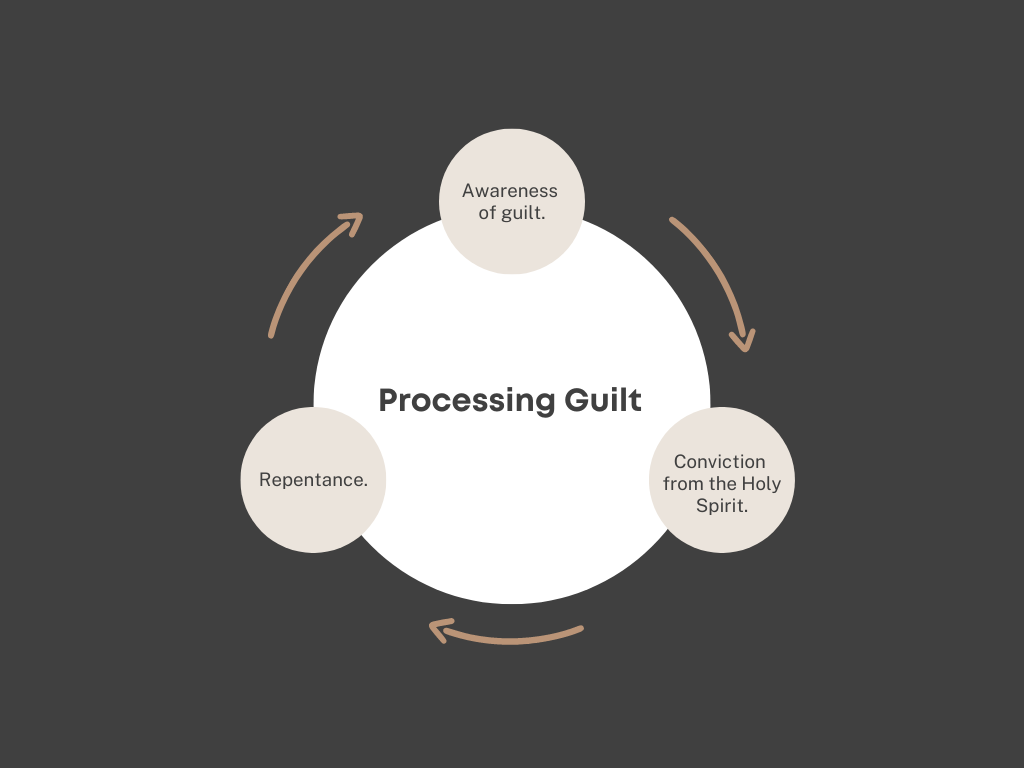Our focus scripture for how to deal with guilt in a Biblical way is from 2 Corinthians 7:9-10.
2 Corinthians 7:9-10 says, “As it is, I rejoice, not because you were grieved, but because you were grieved into repenting. For you felt a godly grief, so that you suffered no loss through us. For godly grief produces a repentance that leads to salvation without regret, whereas worldly grief produces death.”
Some researchers suggest that “shame comes about from repeatedly being told, not that we did something bad, but that we are something bad. Consequently, it can close us off from accepting any form of positive regard from others or ourselves.” When we experience shame, we often feel bad about who we are.
WATCH THE VIDEO BELOW BEFORE READING THE FULL BIBLE STUDY ON GUILT
The video will provide practical ways we physically experience guilt and provide even more understanding of how to process and handle guilt.
Identifying Shame: Signs and Symptoms
- Self-sabotage
- Lack of the fruit of the Holy Spirit
- Self-criticism
- Chronic people-pleasing
- Constantly not feeling good enough
- Anger or defensive behavior
- Constantly feeling like you can’t do anything right
- Always thinking something is wrong with you
Defining Guilt and Its Role in Our Lives
Therapists describe guilt as something we have when we compare something we’ve done or failed to do. We feel guilt because we compare it to our values, leading to physiological discomfort. I like to say we live in tension. We experience guilt because of sin. We feel the tension between what we know is right, pure, and good and the reality that we did not choose between right, pure, and good. This tension causes us to feel uneasy and unsettled.
Concept of Guilt in the Bible
In the Old Testament, the Hebrew word often translated as “guilt” is “asham,” which can refer to the act of committing a sin, the state of guilt resulting from that sin, and even the guilt offering that was made to atone for the sin. In the New Testament, the Greek word “enochos” is used to indicate being guilty or liable for punishment.
However, it’s important to understand that while the Bible speaks clearly about guilt as a result of sin, it also provides a remedy for that guilt. The Bible consistently teaches that all people have sinned and are, therefore, guilty before God (Romans 3:23). This guilt creates a separation between humanity and God.
The Christian message is one of redemption and forgiveness of sins. The New Testament particularly emphasizes that through the sacrificial death and resurrection of Jesus Christ, individuals can be forgiven of their sins, and their guilt can be removed. This is exemplified in passages like Romans 8:1: “There is therefore now no condemnation for those who are in Christ Jesus.”
Recognizing Guilt: Indications and Consequences
- Feeling bad about something you did
- Evaluating an action as right or wrong
- Failure is the result of a poor decision
- Failure is the result of a personal flaw
- Promotes problem-solving
- Leads to apologies and attempts to repair trust
- Involves taking accountability
Exploring Shame and Guilt: A Deep Dive into 2 Corinthians 7:9-10
2 Corinthians 7:9-10, “As it is, I rejoice, not because you were grieved, but because you were grieved into repenting. For you felt a godly grief, so that you suffered no loss through us. For godly grief produces a repentance that leads to salvation without regret, whereas worldly grief produces death.”
This probably is not the letter of 2 Corinthians but a letter that Paul wrote between 1 and 2 Corinthians.
It helps if we remember the sequence of events. Things were going badly among the Christians in Corinth, and in an attempt to get them on track, Paul made a quick, unplanned visit that only seemed to make things worse (the “sorrowful visit” mentioned in 2 Corinthians 2:1). After the failure of this visit, Paul decided not to visit Corinth again in person at the time but instead sent Titus to them with a strong letter of rebuke. Paul was very worried about how the Corinthians would receive the letter and whether it would turn them to Jesus or just make them angry. When Titus came back with good news from the Corinthian Christians, Paul was greatly relieved.
Let’s break down the Greek concepts of guilt from 2 Corinthians 7:9-10:
“Sorrow led to repentance”: The word used for repentance in the Greek is “metanoia,” which literally means “change of mind.” It doesn’t simply mean feeling sorry but involves a whole change of attitude and direction.
“Godly sorrow”: The Greek term here is “lupe kata Theon,” which indicates a type of sorrow or grief that aligns with God’s perspective. This is a sorrow not just because of consequences but because the sin itself is against God and against His perfect, righteous character.
“Sorrow of the world”: The Greek term is “lupe tou kosmou,” a sorrow or grief that is based on worldly, not spiritual, considerations. This could mean being sorry merely because of the worldly consequences of one’s actions, such as loss of reputation or punishment, rather than a true remorse for having done something wrong in God’s sight.
“Repentance leading to salvation”: The Greek word for salvation is “soteria,” which has a broader meaning than just being saved from punishment. It implies wholeness, healing, and restoration, indicating that the repentance brought about by godly sorrow is part of a process that ultimately brings us back into a right and whole relationship with God.
The essence of these verses is that Paul sees a value in the sorrow they’ve experienced because it has brought them to a place of genuine repentance (a change of mind and heart), not just a worldly regret. This is a type of sorrow that recognizes the seriousness of sin as an offense against God. This leads to a true repentance that is transformative, leading to salvation, to a restored relationship with God, not a regret that leads to death.
Repentance begins with an intellectual recognition and confession of sin, but it does not end there. There is also a “change of heart”—an emotional component in which the genuine believer mourns over having sinned against the God whom he loves.
In the context of Greek understanding, the word for repentance in the original Greek is “metanoia”, which signifies a change of mind, a reorientation, or a fundamental transformation of outlook. So it’s not merely about regret but a transformative change in one’s life and perspective.
Therefore, this passage, in essence, speaks to the process of recognizing one’s sins, feeling a deep, godly sorrow for them, and then turning away from these sins in a transformative manner that leads to salvation. It underscores the power of true repentance in the Christian journey.
Learning from Commentary: Insights from Matthew Henry
Deep humility before God, hatred of all sin, with faith in Christ, a new heart, and a new life make repentance unto salvation. Repentance begins with an intellectual recognition and confession of sin, but it does not end there. There is also a “change of heart”—an emotional component in which the genuine believer mourns over having sinned against the God whom he loves.
From Guilt to Freedom: The Process Outlined in the Bible
The Bible portrays a process that begins with guilt, moves to conviction, and then leads to repentance. This journey, which is often facilitated by the Holy Spirit, is a significant part of the Christian faith.
Firstly, the awareness of guilt comes when we recognize we’ve committed a sin. In Romans 3:23, it is written, “For all have sinned and fall short of the glory of God.” Our guilt reveals that we have transgressed God’s laws and standards.
Secondly, conviction is the work of the Holy Spirit that makes a person realize their guilt before God. This is mentioned in John 16:8 when Jesus says, “And when he comes, he will convict the world concerning sin and righteousness and judgment.” Conviction is more than just a feeling of guilt or regret; it’s a realization of our separation from God because of our sins, coupled with a desire to change.
Finally, the process leads to repentance, a change of heart and direction, a turning away from sin and towards God. In Acts 3:19, Peter tells the people, “Repent, then, and turn to God, so that your sins may be wiped out, that times of refreshing may come from the Lord.” Repentance is not just about feeling sorry but involves an active decision to turn away from sin and turn back to God.
One example of this process can be seen in the story of David in the Old Testament. When the prophet Nathan confronts David about his sin with Bathsheba, David feels guilty, is convicted of his sin, and then repents (2 Samuel 12:1-13, Psalm 51).
However, the Bible also makes it clear that God doesn’t want us to live in a state of guilt. God is gracious and merciful, and when we confess our sins, He forgives us (1 John 1:9). Conviction is intended to bring us back to God, not to make us feel perpetually guilty. It’s a means of grace, leading us to experience God’s forgiveness and love.
5 Questions to Ask Yourself When Dealing with Guilt
How do you personally define “shame,” and can you identify its impacts on your own mental state and self-perception?
Can you identify any signs or symptoms in your own behavior that might indicate you’re experiencing shame?
How do you understand the concept of “guilt” in your own life? Can you differentiate it from the feelings of shame?
How do you interpret the concept of guilt as represented in the Bible? Can you reflect on the ways the New Testament provides a remedy for that guilt in your life?
Reflect on the three steps outlined in the Bible that take a person from guilt to freedom. Can you apply these steps to your own life? What significance does each step hold for you in your personal journey of faith?






I missed the first lesson! Am i able to get it now please?
Hey Peggy! You should have received an email too with the lesson. Did you check spam?